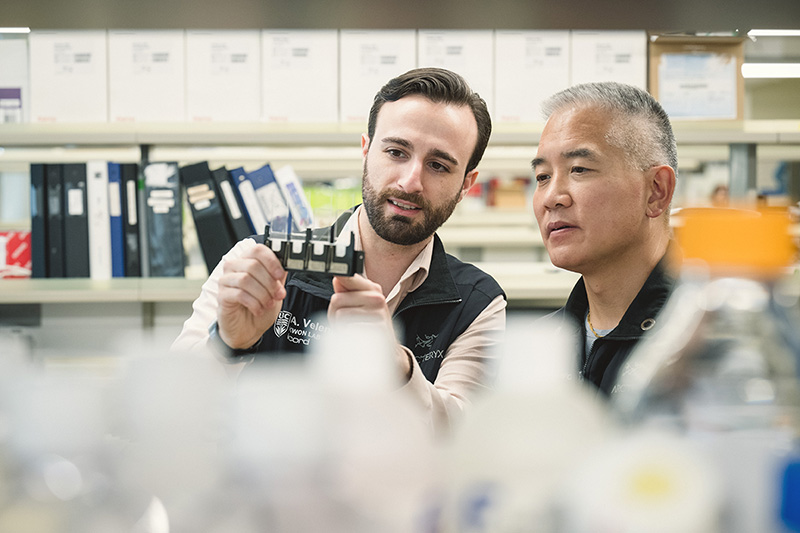
The International SCI Biobank, headed by Dr. Brian Kwon (shown right, with ISCIB manager Adam Velenosi) has received a major investment from Brain Canada. (photo: Martin Dee)
Brain Canada announced its support for two pioneering neuroscience research platforms at UBC through its Platform Support Grants (PSG) program, including an expansion of the International SCI Biobank at ICORD. These investments aim to accelerate discovery and foster open science, positioning Canada at the forefront of global neuroscience health innovation.
Promoting Global Spinal Cord Injury Research Through Human Biobanking, led by ICORD Director and UBC Professor of Orthopaedics, Dr. Brian Kwon, which will expand access to vital human biological samples for spinal cord injury (SCI) research, enabling researchers worldwide to advance treatments and improve outcomes for patients.
“This platform represents a critical step toward advancing spinal cord injury research globally,” said Dr. Kwon. “By providing access to high-quality human biosamples, we’re enabling researchers worldwide to develop and test new treatments that could dramatically improve quality of life for patients.”
The International Spinal Cord Injury Biobank (ISCIB), which was established by Dr. Kwon in 2019, is a multi-user biorepository of specimens obtained from patients who have sustained a traumatic SCI. The mission of ISCIB is to accelerate therapeutic development for traumatic SCI by improving biological understanding of human injury, with an overarching vision of serving as a global research resource where human SCI biospecimens are shared with researchers around the world. ISCIB houses serum, plasma, cerebrospinal fluid, and whole-blood samples obtained from SCI patients, in addition to the entire spinal cords of individuals who have died in hospital following an acute traumatic SCI. Researchers from anywhere in the world can request biospecimens, clinical/neurologic data, and imaging, affording them a unique opportunity to test their hypotheses with human biospecimens obtained from patients who have suffered this injury. The requests are vetted by a scientific access committee, and if approved, the biospecimens are released to the researchers without requirements for co-authorship or intellectual property.
The Brain Canada PSG will not only help facilitate ISCIB’s ongoing operations for 3.5 years, but will also allow for local expansion into chronic SCI enrolment and collections. Here, ISCIB will partner with SCI-BC to raise awareness about the biobank and recruit individuals who are willing to donate their spinal cord to ISCIB after they pass away. After consenting for spinal cord donation, these individuals will undergo a comprehensive characterization of their injury, including a clinical examination of neurologic impairment, an MRI of the spinal cord, electrophysiologic assessment, documentation of neuropathic pain, spasticity, autonomic dysreflexia, orthostatic hypotension, and other patient-reported outcomes.
In addition, there are currently over 3,500 PAXgene Blood RNA tubes stored within ISCIB. The Brain Canada PSG will enable additional molecular analyses of these samples to investigate the responses to injury and identify additional biomarkers of injury, with the goal of having this data available within the biobank to promote open science and support future research requests through the release of this data. This will ensure that the resulting data can be utilized indefinitely to both further the understanding of the pathophysiology of acute SCI and to establish specific genetic biomarkers or biomarker signatures to complement ISCIB’s existing dataset.
The fundamental rationale for establishing ISCIB was to improve our field’s understanding of human SCI and advance the development of therapeutics for this devastating condition, and as such, the main impact of Brain Canada’s support will be in advancing knowledge of SCI globally. With this expansion into chronic SCI for the spinal cord tissue, and the establishment of a blood transcriptomic database, it is anticipated that ISCIB will continue to remain the world’s premier source of human biospecimens for studying SCI, enhancing neuroscience research capacity not only in Canada but around the globe.
The other newly funded UBC platform is The University of British Columbia Genes, Cells and Circuits (UBC-GC2) Platform for Next-Generation Multiscale Brain Research, led by Dr. Mark Cembrowski, which will integrate state-of-the-art technologies to map brain function and connectivity from molecules to entire circuits, unlocking insights into complex brain disorders.
Both platforms exemplify UBC’s commitment to advancing neuroscience and fostering collaboration within and beyond Canada’s borders.
The two Brain Canada PSGs were announced at UBC today, and are part of Brain Canada’s broader Platform Support Grants initiative, which has already invested in numerous projects across Canada to empower researchers with shared tools, data resources, and collaborative opportunities. The full list of funded platforms will be unveiled later this month.
Brain Canada is contributing over $18 million in this year’s PSG program through the Canada Brain Research Fund (CBRF), funded by Health Canada, as well as matching donations from sponsors for a total investment of $36.8 million. By enabling access to cutting-edge tools and specialized skills beyond the reach of individual researchers, the PSG program plays a vital role in strengthening the research landscape.
For more information, please visit www.braincanada.ca.

